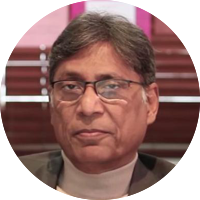Qaroon (Croesus)
Qaroon, also known as Croesus, is considered to be one of the richest men in history. He was an Israelite who lived in Eggypt but refused to pay heed to Prophet Musa’s (Moses) call. He is rumoured to have separate rooms filled with bags of gold, silver and all other precious gems. He lived in the grandest possible palace and the townsmen envied his fabulous possessions.
Qaroon took pride in his riches and status and believed that his wit and skills alone had brought him the wealth that he possessed. This opulence was in stark contrast to the plight of the people who were suffering and were barely able to meet their needs. Musa saw this and tried to convince Qaroon about the virtues of humility and generosity but it proved futile. Qaroon became even more defiant and shrugged off the matter with indifference. One day, the earth shook and the people of the town rushed out of their homes only to see that Qaroon’s palace had been swallowed by the earth. Qaroon, who was in the habit of counting and recounting his riches, had also been buried along with his riches. This made the people realize that he was not to be envied but pitied for his lack of faith in God.
Reference: Kho ke dil ko ham is qadar khush hain/Jaise Qaroon ka khazana mila (Safi Aurangabadi), Qaroon ka khazana ho ke Hatim ki sakhaawat/Sab kuchh hai magar kuchh naheen maikhar ke aage (Hafeez Jaunpuri), Daulat-e duniya na kaam aaigi kuchh bhi baad-e marg/Hai zameen mein khaak Qaroon ka khazana ho gaya (Bhartendu Harishchandra), Deenar-o-dirm ko na la dil ko daam mein/Qaroon se hai khabar ke khazaane ne kya kiya (Sheikh Zahurduddin Hatim), Tu mushtaaqon se apni chashm poshi roz karta hai/Tere deedar ki daulat bhi Qaroon ka khazana hai (Arshad Ali Khan Qalaq).
Qaroon, also known as Croesus, is considered to be one of the richest men in history. He was an Israelite who lived in Eggypt but refused to pay heed to Prophet Musa’s (Moses) call. He is rumoured to have separate rooms filled with bags of gold, silver and all other precious gems. He lived in the grandest possible palace and the townsmen envied his fabulous possessions.
Qaroon took pride in his riches and status and believed that his wit and skills alone had brought him the wealth that he possessed. This opulence was in stark contrast to the plight of the people who were suffering and were barely able to meet their needs. Musa saw this and tried to convince Qaroon about the virtues of humility and generosity but it proved futile. Qaroon became even more defiant and shrugged off the matter with indifference. One day, the earth shook and the people of the town rushed out of their homes only to see that Qaroon’s palace had been swallowed by the earth. Qaroon, who was in the habit of counting and recounting his riches, had also been buried along with his riches. This made the people realize that he was not to be envied but pitied for his lack of faith in God.
Reference: Kho ke dil ko ham is qadar khush hain/Jaise Qaroon ka khazana mila (Safi Aurangabadi), Qaroon ka khazana ho ke Hatim ki sakhaawat/Sab kuchh hai magar kuchh naheen maikhar ke aage (Hafeez Jaunpuri), Daulat-e duniya na kaam aaigi kuchh bhi baad-e marg/Hai zameen mein khaak Qaroon ka khazana ho gaya (Bhartendu Harishchandra), Deenar-o-dirm ko na la dil ko daam mein/Qaroon se hai khabar ke khazaane ne kya kiya (Sheikh Zahurduddin Hatim), Tu mushtaaqon se apni chashm poshi roz karta hai/Tere deedar ki daulat bhi Qaroon ka khazana hai (Arshad Ali Khan Qalaq).
Additional information available
Click on the INTERESTING button to view additional information associated with this sher.
About this sher
rare Unpublished content
This ghazal contains ashaar not published in the public domain. These are marked by a red line on the left.

